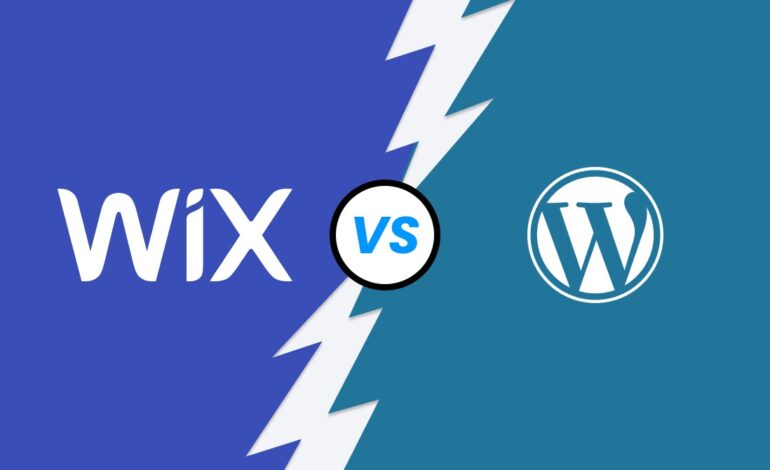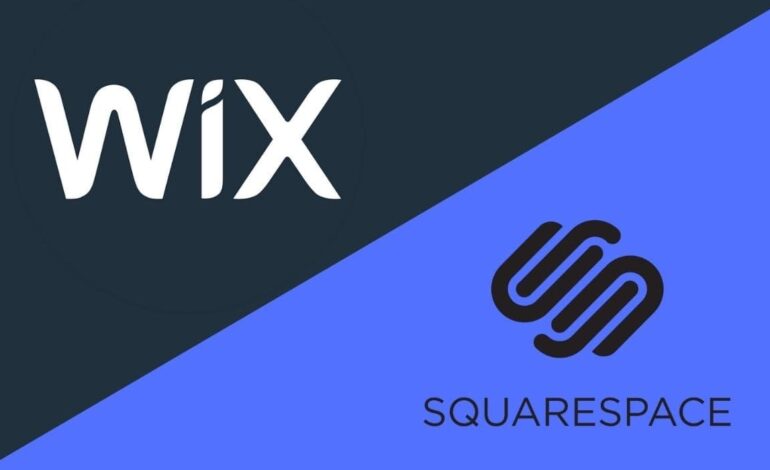
Building a website has never been easier, thanks to platforms like Wix and WordPress. These two dominate the market for website creation, offering tools tailored to both beginners and experienced users. However, they cater to different needs and preferences, making it essential to understand their features before deciding. Let’s dive into a detailed comparison of Wix and WordPress to help you make the best choice.
Ease of Use
- Wix:
Wix is designed for simplicity and accessibility, making it ideal for beginners. Its drag-and-drop editor lets you visually build your site by placing elements like text boxes, images, and widgets wherever you want. No coding skills are needed, and the interface is user-friendly. - WordPress:
WordPress (specifically WordPress.org) is more complex and comes with a learning curve. While it doesn’t offer drag-and-drop editing out of the box, you can use page builders like Elementor or WPBakery to achieve a similar experience. However, WordPress is more suitable for users who are comfortable with some technical knowledge or are willing to learn.
Verdict: Wix is better for beginners, while WordPress is ideal for users seeking customization and control.
Design Flexibility
- Wix:
Wix offers over 800 professionally designed templates that are visually appealing and cater to various industries. However, once you select a template, you cannot switch to another without rebuilding your site. - WordPress:
WordPress shines when it comes to flexibility. It supports thousands of free and premium themes that you can easily switch between. You also have full control over your website’s design through custom CSS and plugins.
Verdict: WordPress provides greater flexibility, especially for advanced design needs.
Customization and Features
- Wix:
Wix offers a range of built-in features, including blogging tools, e-commerce functionality, and SEO settings. While you can integrate third-party apps from the Wix App Market, your options are limited compared to WordPress. - WordPress:
WordPress is open-source, meaning you can customize every aspect of your site. With over 58,000 plugins available, you can add functionalities like advanced SEO, analytics, e-commerce, and more.
Verdict: WordPress wins in customization and features due to its extensive plugin library.
E-Commerce Capabilities
- Wix:
Wix offers a straightforward e-commerce solution through Wix Stores. It’s suitable for small to medium-sized businesses, allowing you to manage inventory, accept online payments, and create discount codes. However, scalability may be an issue for larger stores. - WordPress:
WordPress relies on plugins like WooCommerce for e-commerce. WooCommerce is highly customizable, scalable, and supports advanced features like multiple payment gateways, shipping options, and tax settings.
Verdict: WordPress, with WooCommerce, is a better choice for businesses aiming for extensive e-commerce capabilities.
SEO Features
- Wix:
Wix has built-in SEO tools that are easy to use. It allows you to edit meta tags, alt texts, and URLs and provides an SEO wizard for guidance. However, its SEO capabilities are not as robust as WordPress. - WordPress:
WordPress is considered the gold standard for SEO. With plugins like Yoast SEO and Rank Math, you can optimize every aspect of your website, from keywords to XML sitemaps. Additionally, WordPress sites are faster and more lightweight, which helps with rankings.
Verdict: WordPress offers superior SEO capabilities.
Pricing
- Wix:
Wix operates on a subscription-based model with plans ranging from basic personal websites to advanced business options. While it includes hosting, your monthly cost can add up as you scale. - WordPress:
WordPress itself is free, but you’ll need to pay for hosting, a domain name, and possibly premium themes or plugins. Hosting plans are often affordable, and costs depend on your site’s complexity.
Verdict: Wix is easier to budget for beginners, but WordPress can be more cost-effective for advanced users.
Hosting and Ownership
- Wix:
Wix is a hosted platform, meaning your website is tied to its servers. This makes setup easier but limits control over hosting and server performance. - WordPress:
WordPress gives you full control over hosting. You can choose a provider based on your needs, ensuring better performance and scalability. This also means you fully own your website’s data and files.
Verdict: WordPress offers more control and ownership.
Customer Support
- Wix:
Wix provides robust customer support, including 24/7 availability, a detailed knowledge base, and direct assistance through email or phone. - WordPress:
WordPress does not have dedicated support, but you can access help through community forums, tutorials, and third-party developers. For managed hosting services, providers like Bluehost or SiteGround often include support.
Verdict: Wix offers better customer support, especially for beginners.
Scalability
- Wix:
Wix works well for small to medium-sized websites, but its limitations become apparent as your site grows. - WordPress:
WordPress is highly scalable, capable of handling large websites, e-commerce stores, and high traffic.
Verdict: WordPress is the better option for long-term scalability.
Security
- Wix:
Wix handles security for you, including SSL certificates and updates. This makes it a hassle-free option for users who prefer not to manage technical aspects. - WordPress:
With WordPress, security depends on your hosting provider and the plugins you use. While this offers flexibility, it also means you’re responsible for updates, backups, and malware protection.
Verdict: Wix is simpler for security, but WordPress offers more control.
When to Choose Wix
- If you’re a beginner looking for an easy-to-use platform.
- If you need a simple website without advanced features.
- If you prefer a managed, all-in-one solution with dedicated support.
When to Choose WordPress
- If you require advanced customization and control.
- If you’re building a large-scale or e-commerce-heavy website.
- If SEO and scalability are critical for your project.
Both Wix and WordPress are powerful tools, but they cater to different audiences. Wix is ideal for beginners or small businesses that need a quick, easy-to-manage website. WordPress, on the other hand, is perfect for those who want flexibility, scalability, and advanced customization options.
Consider your goals, technical expertise, and budget to choose the platform that aligns best with your needs. Whether it’s Wix’s simplicity or WordPress’s limitless potential, the right choice will empower you to bring your vision to life.


